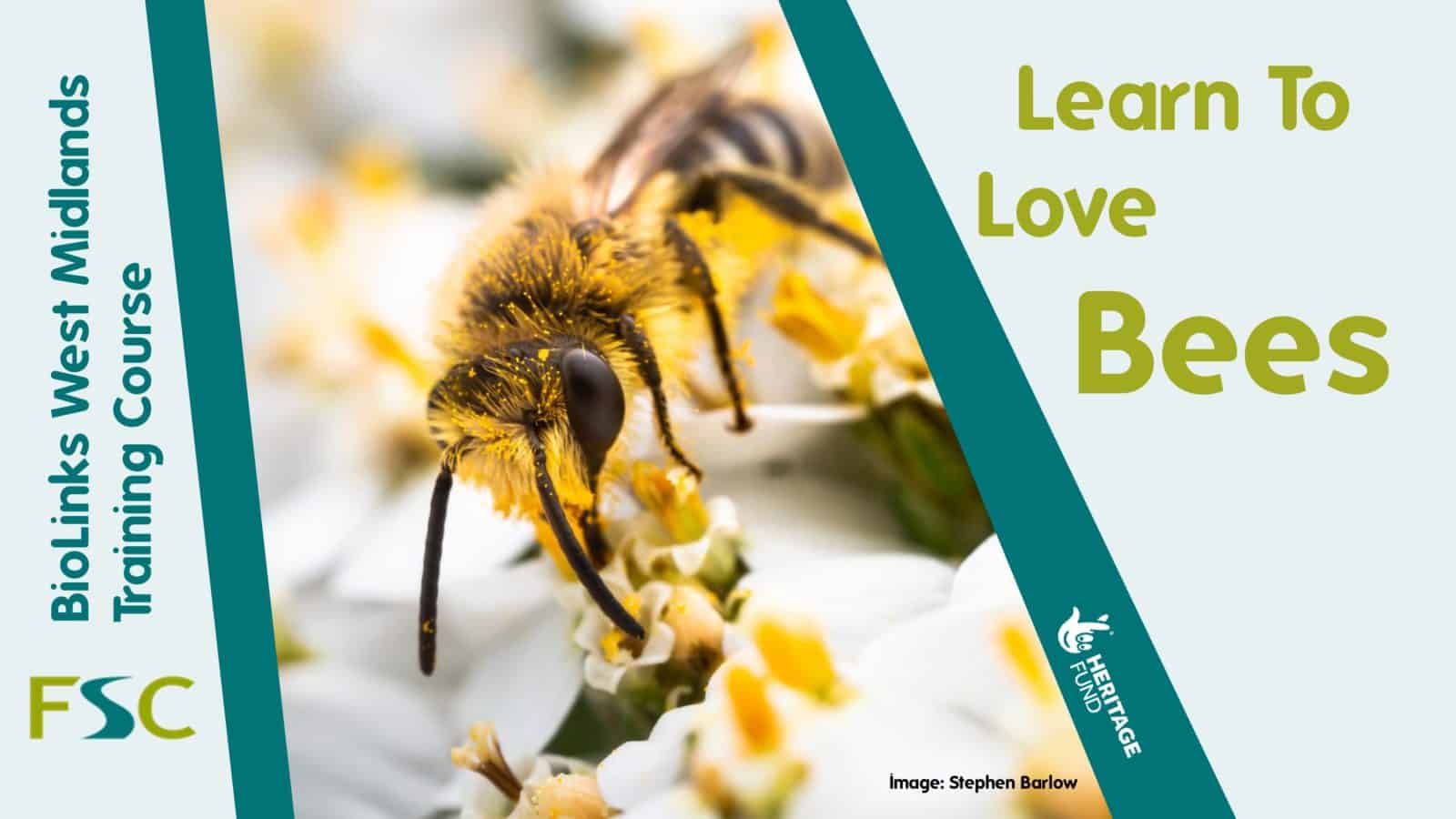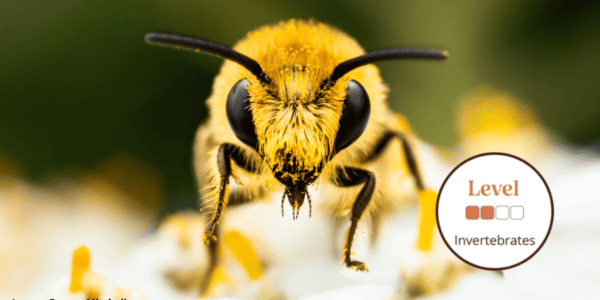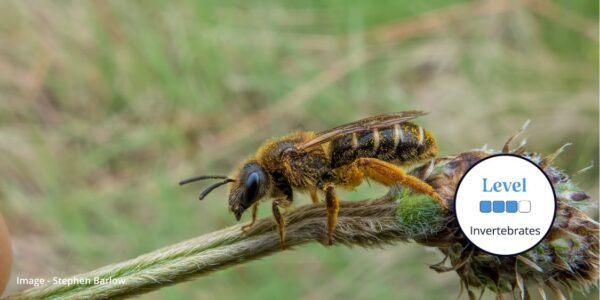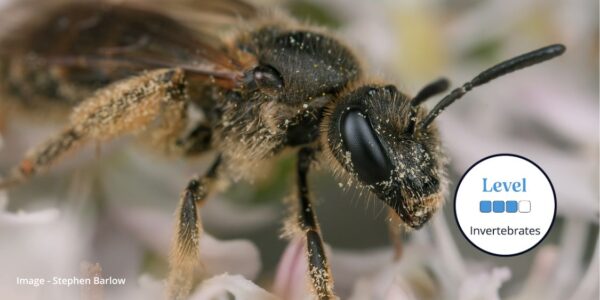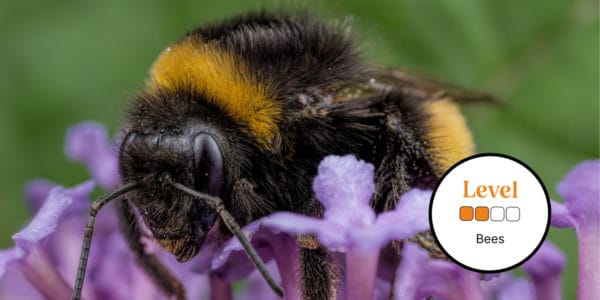There are around 270 species of bee in Britain, although many are under-recorded, under-appreciated and under-loved! Found in a range of habitats, bees have fascinating life histories and ecosystem roles.
If you’re interested in finding out more about bees but don’t feel ready for a beginner’s ID workshop, then this is the course for you. Learn To Love Bees is a very gentle introduction to our planets most important pollinators, introducing aspects of their biology and ecology.
This course combines the use of classroom-led learning and outside learning opportunities led by one of our bee tutors to give individuals the skills and confidence to learn more about the lives and ecological role of bees.
- Certificate upon course completion.
- Please email [email protected] if you have any questions.
- Please note that this course is NOT a species identification course and will only go as far as categorising British bees into broad categories.
This course is aimed at adults only and course attendees must be at least 18 years old in order to attend.
What will be covered during this course?
- Recognising bees from other similar looking insects and discussing their place in the animal kingdom.
- An introduction to bee biology, including their anatomy and morphology.
- An overview of the species diversity of bees in the UK
- The role of bees in the process of pollination and reproduction in flowering plants.
- How to go about finding wild bees in different habitats.
See the ‘Example Timetable’, ‘What’s Included’ and ‘Before YouAttend’ sections below for more information about this course.
Course Fees
Regular Price: £75 For professionals and residents outside of the UK. Select ‘Attendee: In Person’ Sold Out
Subsidised Price: £10 Subsidised by the FSC BioLinks project for non-professionals eg. volunteers, biological recorders, wildlife gardeners, amateur naturalists and students.Available to UK residents only. Select ‘Attendee Subsidised: In Person’
Tutor: Aaron Bhambra
Aaron is an entomologist from the West Midlands who has been studying insects for several years as a pollinator specialist and insect ecologist. His main interests are with ‘urban’ invertebrates and the countless fascinating species which can be found in towns and cities across the UK.
His previous research has focussed on solitary bees, developing habitats for these beneficial and often undervalued pollinators throughout Birmingham, with the Peoples Trust for Endangered Species and the British Entomological and Natural History Society. Aaron started his love for bees with the FSC as a volunteer on their BioLinks courses, before progressing through their learning pathway into a tutoring role. Aaron joined the FSC BioLinks project team as a project officer developing and delivering online bee courses before moving on to undertake a PhD studying pollinators.
Covid Measures
In order to keep our customers and staff safe, we ask that anyone attending our centres:
- Wears a face covering when in shared indoor space (unless exempt).
- Maintains social distancing.
- Cleans their hands regularly.
- Takes a Covid-19 test before they arrive.
Book with Confidence
We understand the difficulties of making plans in the current situation when guidelines continue to change, and insurance conditions are being tightened. In response, we will continue to offer additional flexibility. Find out more here
Example Timetable
- Please arrive in time for the course to start promptly at 10:00 am.
- Refreshments will be available from 9.45 am.
- The course will end at 4:00 pm.
What's Included
- 6 hours of tuition
- Certificate of attendance
- Any excursions will be on foot
Bursaries and Subsidies
FSC BioLinks
FSC BioLinks is an exciting project for FSC in the South East and West Midlands, bringing together existing volunteers with skills in biological recording and identification, and new volunteers.
This project provides subsidised training courses, learning opportunities and digital tools focussed on invertebrate identification for anyone involved or interested in biological recording, to build and strengthen the community.
Invertebrates provide us with many useful ecosystem services, like pollination and decomposition, which we cannot survive without but their numbers are declining. Few people know how to identify or record invertebrates meaning there is a lack of data
We are delighted to have been awarded a grant of £1.23 million from the National Lottery Heritage Fund for this project.
Before You Attend
Getting to Pump House Environment Centre, Worcester
Pump House Environment Centre, Waterworks Road, Worcester, WR1 3EZ
By Car: To reach the Pump House, turn onto Barbourne Lane, the left into Pitchcroft lane and immediately right. Follow the road round to the right. The Pump House will be immediately in front of you.
By Train: Worcester is serviced by two train stations. Both stations are a 20 minute walk away.
By Bus: A regular bus service is available from Crowngate Bus station to the Barbourne brook stop, next to Gheluvelt Park.
What to bring
- Notebook and pencil
- Lunch
- Hand lens (if you have one)
Due to the outside nature of part of this course, participants are advised to bring suitable clothing and footwear in order to access the site in various weather conditions.
This BioLinks course has aspects that will be taught outdoors with walking to field sites over uneven ground. No special preparation is required providing you are used to gentle exercise. If you have any concerns or questions about access or the activities involved, please get in touch.
There will be a member of staff with first aid training and access to a first aid kit on site. If you have special medical requirements please let us know as soon as possible so we can plan the course.
Sorry this course has ended

